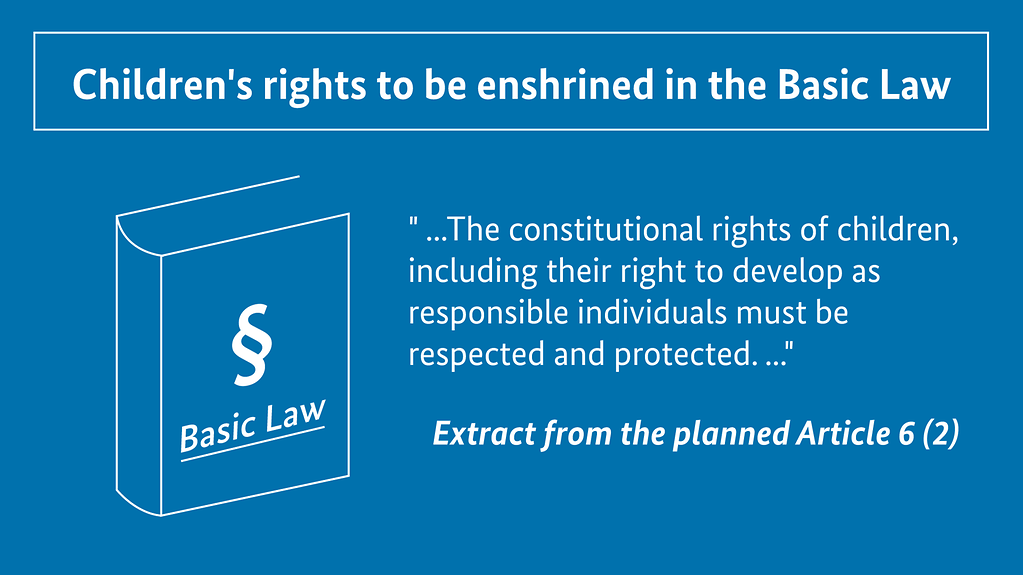Change in legislation
Children’s rights are to be specifically enshrined in Germany’s Basic Law, the Cabinet has decided. This is to underline the special importance of children and their rights. The rights of parents are not to be restricted in any way.
4 min reading time

The special importance of children and their rights in our society are to be underscored.
Heading: Children's rights to be enshrined in the Basic Law
A book labelled Basic Law
Beside it, an extract from Article 6(2) " ...The constitutional rights of children, including their right to develop as responsible individuals must be respected and protected. ..."
Photo: Bundesregierung
In Germany children have all the same basic rights as adults, but are also considered to be in need of special protection. This has not hitherto been explicitly stated in the Basic Law, Germany’s constitution. To make clear how important children and their rights are in our society, their rights are to be expressly enshrined in the Basic Law, making them more visible. The Cabinet has now adopted a bill to this effect. The bill must be passed by a two-thirds majority in both houses of the German Parliament, the Bundestag und the Bundesrat, in order to change the Basic Law.
Article 6 (2) is to be extended to include the following: "The constitutional rights of children, including their right to develop as responsible individuals must be respected and protected. Children’s best interests must be taken into account in an appropriate manner. The constitutional entitlement of children to a fair hearing in front of the law must be ensured. The primary responsibility of parents shall remain unaffected."
A broad discussion process preceded the bill. Within a working group, representatives of federal and state levels consulted on how to word the basic rights of the child. In October 2019 they presented their final report. On this basis, the coalition drew up the draft legislation.
Four elements in the constitutional amendment
There are four elements involved in the constitutional amendment:
- The bill clearly states that children are holders of basic rights, which must be respected and protected. These include, in particular, the right of children to develop as responsible individuals.
- The best interests of the child must be taken into account in an appropriate manner, thus enshrining the principles of the best interests of the child in the constitution. At the same time, the use of the term ‘appropriate’ ensures that the interests of other holders of basic rights are also taken into account, insofar as these potentially contradictory interests must be reconciled in an appropriate manner.
- Children’s entitlement to a fair hearing in front of the law is also re-asserted. The best interests of the child can only be taken into account in an appropriate way, if the actual interests of the child in question have previously been ascertained.
- This bill does not in any way change the primary responsibility of parents or the role of the state to watch over them in the performance of this duty and guard against the best interests of the child being jeopardised, both of which are already laid out in the German Basic Law.
The rights of parents are not restricted
One core concern behind this amendment to the German Basic Law is that the rights and responsibility of parents should not be limited. The substance of these rights continues to be guaranteed without any change. The amendment specifically makes no change to the existing well balanced relationship between parents, children and the state. The basic rights of the child are thus not expanded to the detriment of other rights holders (such as parents for instance).
The Basic Law will continue to give parents, not the state, the primary responsibility for the development of their children ("the duty primarily incumbent on them"). The state should only intervene if the parents jeopardise the best interests of the child.
The origins: the United Nations Convention on the Rights of the Child
Since Germany ratified the United Nations Convention on the Rights of the Child in 1992, the inclusion of specific children’s rights in the German Basic Law has been discussed. By ratifying the Convention, Germany undertook to respect, protect and advance the rights of children. In Germany everybody under the age of 18 is considered to be a child. The best interests of the child must be taken into account as the primary consideration in all state decisions that affect children.
During the consultations on the constitutional amendment, the coalition agreed that the best interests of the child should be taken into account "in an appropriate manner". This was based on constitutional principles and legal wording. The wording selected fits better with the language used in the Basic Law than the wording of the UN Convention, which is based on international law, and leaves the scope required for constitutional-law considerations. The new provisions also make it clear that the best interests of the child must always be respected.